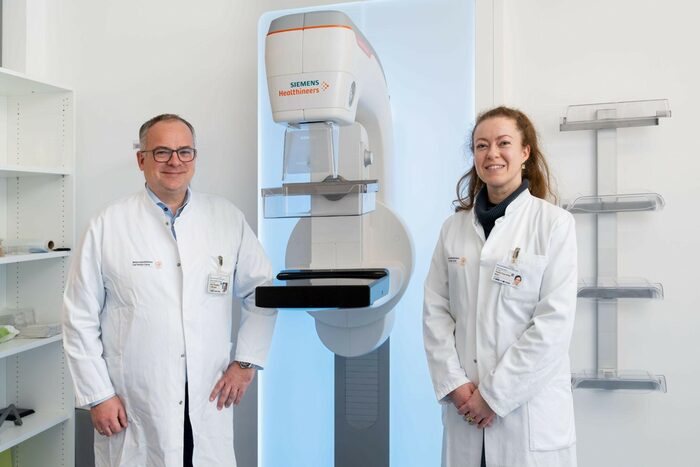|
Landeshauptstadt Dresden - www.dresden.de https://www.dresden.de/en/business/tomorrow-s-home/news/2024/009-transpara.php 24.06.2024 16:16:13 Uhr 22.04.2025 05:07:03 Uhr |
|
AI-based software supports the early diagnosis of breast cancer

Improving the early detection of breast cancer and thus increasing patients' chances of survival: Dresden University Hospital is also using AI-based software for this purpose. This means that several procedures can now be used simultaneously in mammography in order to increase the success of treatment. In addition to the support provided by artificial intelligence, the expertise of radiologists is of course still indispensable.
The University Hospital Carl Gustav Carus Dresden has also been using artificial intelligence for mammography since November 2023. The AI-based "Transpara" software is particularly reliable at recognising the smallest lumps and groups of calcifications – often the precursors of cancer. To do this, the system compares the images with a database of more than five million images. The findings are therefore available more quickly in many cases. And that is extremely important: the earlier the diagnosis is made, the better the patient's chances of survival. Of course, the software is only used as a further component in cancer diagnostics. The professional expertise of radiologists remains central to the success of treatment. Nevertheless, the use of AI saves time and human resources – not an insignificant factor in times of a general shortage of specialised staff. The radiology department at the university hospital is the first facility in the Dresden region to use AI-based software in this way.
"The examination using artificial intelligence provides additional safety and will become the standard in diagnostics in the future. Dresden University Medicine is thus once again setting new standards in terms of modern, forward-looking therapies and diagnostics. Now it is our task to further evaluate the application in practice in the coming years," says Prof Michael Albrecht, Medical Director of the University Hospital. The Head of the Institute and Polyclinic for Diagnostic and Interventional Radiology, Prof Ralf-Thorsten Hoffmann, continues: "Transpara provides radiologists with a 'second pair of eyes'. This will further improve reading accuracy in mammography."
Breast cancer is the most common type of malignant cancer for women in Germany: around 70,000 new cases are counted every year – around one in eight women are affected during their lifetime. This is precisely why artificial intelligence is to be further developed in the future. The hope lies in even faster and more reliable breast cancer detection and the reduction of misdiagnoses. The different breast densities of women will also be given more consideration in future iterations. The technology company ScreenPoint Medical is responsible for the software.






